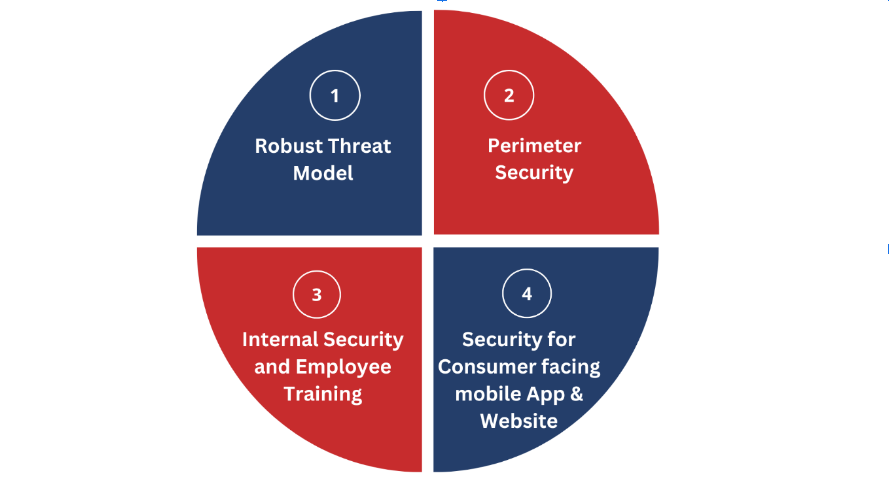SUMMARY
Emerging enterprises can become easy targets for cybercriminals who are eager to exploit any vulnerability
The first step in embracing cybersecurity is to understand the specific threats that could target the startup
Securing mobile apps is of utmost importance to avoid any financial damage or attracting any penalties
India aspires to become the world’s third-largest economy by 2030 by achieving a $5 Tn GDP. This requires a big surge in innovation and entrepreneurship. Aspiring to be a fully developed nation by 2047, the government has implemented strategic policies to bolster the economy, employment, innovation, and industrial output.
At the forefront of this transformation are Indian startups, constituting the world’s third-largest startup ecosystem and poised for consistent annual growth of 12-15%. Disrupting conventional industries, these startups are pioneers in technology, healthcare, renewable energy, and more.
One of the key challenges for startups is to prioritise cybersecurity. Emerging enterprises can become easy targets for cybercriminals who are eager to exploit any vulnerability to gain unauthorised access to sensitive data. Increasing risk quotient multifold. The outcome of this can extend beyond financial losses and brand reputation.
Cybersecurity Challenges For Startups
Entrepreneurship is exhilarating, but it comes with its unique set of challenges. While many startups may prioritise building their products or services, it’s essential to recognise and address common cybersecurity challenges.
With limited financial means, the emphasis naturally gravitates towards scaling the business, inadvertently neglecting the crucial aspect of cybersecurity. This oversight is further compounded by a lack of cybersecurity expertise within the organisation, leaving it susceptible to potential threats emerging in the digital landscape.
In navigating this dynamic ecosystem, it becomes imperative for startups to bridge the gap in cybersecurity knowledge, effectively counteract the evolving threat landscape, and strike a delicate balance between fortifying security measures and fostering innovation for sustained success.

Building A Robust Cyber Threat Model
Startups may not have the financial muscle of larger enterprises, but they are not immune to cyber threats. The first step in embracing cybersecurity is to understand the specific threats that could target the startup.
This involves creating a cyber threat model, which identifies potential vulnerabilities, attack vectors, and the impact of a security breach on the business. By prioritising risks and understanding the potential consequences, startups can allocate their limited resources more effectively.
Ensure Perimeter Security
- Data Center (DC) and Disaster Recovery (DR) Security: Protecting the physical and virtual infrastructure is crucial for startups. Implementing access controls, surveillance, and secure data backup and recovery mechanisms are essential components of data centre and disaster recovery security.
- Server Security: Securing servers is fundamental to safeguarding the core of a startup’s operations. Regular updates, vulnerability assessments, and robust access controls are vital for maintaining server security.
- Vulnerability Assessment and Penetration Testing (VAPT) Patching: Startups should conduct regular VAPT to identify and address vulnerabilities in their systems. Timely patching of software and applications helps in closing potential security loopholes.
Internal Security Process and Employee Training
- a) ISO Certification: Obtaining ISO certification (such as ISO 27001 for information security) can enhance the credibility of a startup’s security practices. This internationally recognised standard provides a framework for establishing, implementing, maintaining, and continually improving an information security management system.
- b) Employee Training: Employees are often the weakest link in cybersecurity. Conducting regular training sessions on security awareness, safe computing practices, and the company’s cybersecurity policies is essential to create a culture of security within the organisation.
Security for Customer-Facing Mobile Apps & Website
a) Mobile App Security: While delivering services on mobile apps, startups capture large amounts of sensitive data. It could be the customer’s login credentials, financial transaction history and sensitive information.
Hence securing mobile apps is of utmost importance to avoid any financial damage or attracting any penalties. This includes secure coding practices, encryption, and robust mobile app security measures which protect the application on the runtime basis such as Runtime Application Self Protection (RASP). This technology prevents threats before it arises by securing vulnerable endpoints.
b) Website and Portal Security: Implementing Secure Sockets Layer (SSL), regular security audits, and protecting against common web application vulnerabilities are critical steps to secure customer-facing websites and portals.
While startups may face budget constraints, they should strike the right balance between product development & cyber security.
By understanding the cyber threat model, ensuring parameter and application security, and implementing security processes and employee training, startups can navigate the challenging cybersecurity landscape and build a secure foundation for growth.
Remember, investing in cybersecurity is an investment in the future sustainability and success of the startup.
Disclaimer
We strive to uphold the highest ethical standards in all of our reporting and coverage. We StartupNews.fyi want to be transparent with our readers about any potential conflicts of interest that may arise in our work. It’s possible that some of the investors we feature may have connections to other businesses, including competitors or companies we write about. However, we want to assure our readers that this will not have any impact on the integrity or impartiality of our reporting. We are committed to delivering accurate, unbiased news and information to our audience, and we will continue to uphold our ethics and principles in all of our work. Thank you for your trust and support.



![[CITYPNG.COM]White Google Play PlayStore Logo – 1500×1500](https://startupnews.fyi/wp-content/uploads/2025/08/CITYPNG.COMWhite-Google-Play-PlayStore-Logo-1500x1500-1-630x630.png)